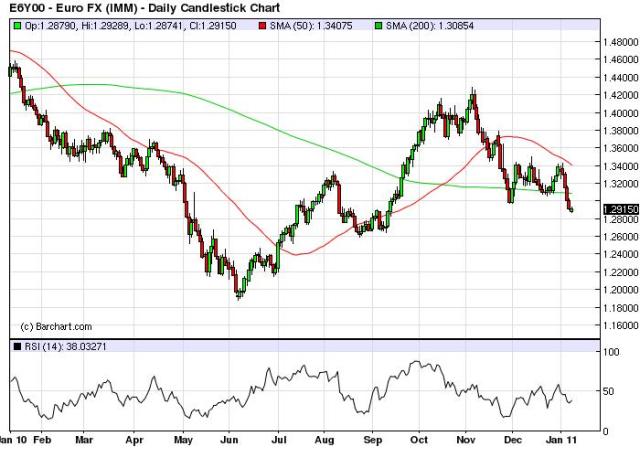Global Macro Monitor produces informed opinion about markets and the global economy. This was originally published on January 10, 2011
~~~
We can’t believe we missed this over the holidays. Germany’s SpiegelOnline reported on December 27,
In a survey conducted in early December by the polling firm Infratest dimap, 57 percent of respondents agreed with the statement that Germany would have been better off keeping the mark than introducing the euro… Germans, it seems, are gripped once again by their historic fear of inflation: According to the Forschungsgruppe Wahlen polling institute, 82 percent of the population is worried about the stability of their currency.
The article opens,
Surveys show that many Germans are worried about the future of the euro, but the country’s political parties are not taking their fears seriously. The number of grassroots initiatives against the common currency is increasing, and political observers say a Tea Party-style anti-euro movement could do well…
As a playwright, Rolf Hochhuth knows how to use timing to achieve the greatest possible impact…Now Hochhuth is campaigning against the euro — and his stage is Germany’s Constitutional Court. “Why should we help rescue the Greeks from their sham bankruptcy?” he asks. “Ever since Odysseus, the world has known that the Greeks are the biggest rascals of all time. How is it even possible — unless it was premeditated — for this highly popular tourist destination to go bankrupt?”
Doesn’t this sound a lot like the political economy and rhetoric in the United States? We posted on Friday how the new House Budget Chairman, Paul Ryan, opposes bailing out states that are in fiscal trouble. Bloomberg reported on Friday,
We are not interested in a bailout,” the Republican from Wisconsin said yesterday in Washington. Ryan said some states are “already telling us” that, when asked how he would respond if he was told one was in danger of defaulting…
Should taxpayers in frugal states be bailing out taxpayers in profligate states?” Ryan asked during a forum near the Capitol. “Should taxpayers in Indiana, who have paid their bills on time, who have done their job fiscally, be bailing out Californians, who haven’t? No, that’s a moral hazard we are not interested in creating.
If you don’t understand the realpolik of the European sovereign debt crisis go no further than Washington. We emphasize that most American states don’t face crushing debt burdens but suffer large cash flow problems and a lack of political will and/or political structure to reduce their deficits. The politics of deficits and debt is the same around the world, however.
As with the U.S. government, the European bureaucrats similarly must have a credible plan that addresses long-term structural issues, must be decisive, and move quickly. We believe 2011 is the make or break year for the Euro as we know it.
This article, at least, to us, illustrates the Eurozone body politic is getting very restless. Politics can sometimes be almost as volatile, unpredictable, and, at times, unstable as markets. Belgium not only risks losing the markets it is now at risk of losing popular support across a wide political and economic spectrum. The general election in Ireland will be a huge political test for Euro sustainability.
SpeigelOnline reports that even Patrick Adenauer, the grandson of the postwar Germany’s first chancellor, Konrad Adenauer, is critical of the Euro,
Adenauer feels that people are avoiding the issue. “The days of the euro as a single currency for countries from Ireland to Greece are numbered, if no debt refinancing with creditor liability is pushed through now,” says Adenauer, who is the head of a German association of family-owned companies. “I’m amazed that political parties and large industry associations are not openly saying this.” Adenauer is sure that his grandfather would also see things this way. “He would look into the question of whether the common currency is really necessary for everyone in this situation, or whether the pressure to adapt will end up being too big and the EU will suddenly find itself politically damaged.”
We also find Hans-Olaf Henkel, former head of Germany’s leading employers’ association, the Federation of German Industries (BDI), ideas on the ultimate outcome similar to Dennis Gartman’s North/South Euro. Der Speigal writes,
Henkel has a mission: He wants to divide the euro. All of the “olive countries” — as Henkel dubs the Greeks, the Italians and the French — should pay in southern euros in the future, he says. The north — in other words, primarily Germany — would pay with the northern euro.
The $/Euro is now at risk of breaking key technical support and the shoulder line of a six-month head and shoulders pattern at 1.26, which, if broken, could take it down to 1.18, its birth rate and long-term support level. Stay tuned.


